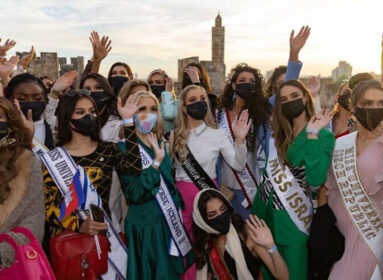
The NY Times “This Life” columnist tackles the subject of happiness and equality, as per the Bible
By Stacey Dresner
Bruce Feiler went on a 10,000-mile journey retracing the Five Books of Moses for his bestseller Walking the Bible. He later traveled through bibilical sites throughout Israel, Iraq and Iran to research Abraham his book on the shared ancestor of the monotheistic religions. And he walked in the footsteps of Adam and Eve for his latest book, The First Love Story: Adam, Eve and Us.
Now, Feiler will combine elements of that book with another of his books, The Secrets of Happy Families when he delivers the Sixth Annual Saul Cohen Lecture, presented by the Schoke JFS at the Ferguson Library in Stamford on Nov. 9. His topic: “The Family Today: Secrets to Stronger Relationships and Greater Happiness at Any Age.”
Feiler writes the monthly “This Life” column for the Sunday New York Times; is the author of six consecutive New York Times bestsellers; and is the presenter of two prime-time series on PBS. His two TED Talks have been viewed more than two million times.
A native of Savannah, Georgia, Feiler lives in Brooklyn with his wife, Linda Rottenberg, and their twin daughters.
He recently spoke with the Jewish Ledger about “The First Love Story.”
JEWISH LEDGER (JL): What led you to write the The First Love Story: Adam, Eve and Us?
BRUCE FEILER (BF): I’ve been writing and exploring Jewish themes and the Hebrew Bible for 20 years now, going back to Walking the Bible and Abraham. And, in a lot of ways, the motivation that got me here 20 years ago was [the question] are these stories real? What is the historical foundation for them? How do I make the biblical stories relevant to today?
At the time I was a single man in my 30s and in the course of that journey I got married and had children. Then I got cancer and I basically couldn’t leave my bed for a year. What happened was, I took this adventurer/ traveler archeologist side of my personality and started applying it to my family. At the time I was sick I had three-year-old twin girls and I started writing a lot about family. I wrote two books about that and started writing a monthly column in the New York Times.
It was in this process that I sort of began to get interested in relationships and love and family.
We were on a trip to Rome around six or seven years ago with our daughters and we took them into the Sistine Chapel. They were complaining about the Vatican, and their feet hurt, and ‘it was boring.’ And I got them in the Sistine Chapel and I said, “look up! I’m going to blow your mind!” And my daughters looked up at Adam and God painted across the ceiling and one said, ‘Well, you know that’s just men. Where am I in this picture?” The other looked up and said, ‘Wait a minute; is that Eve under God’s arm?’ And I realized, one story has been at the heart of every conversation about men and women and families for 3,000 years and maybe that story, as crazy as it sounds, has something to tell us about today.
Even as I tell this story, male/female issues are still here and as unusual as it sounds, I feel going back to this original story and the original family really can be quite helpful in today’s conversations.
JL: You have called the blaming of Eve for bringing shame, sin, even death into the world “the biggest character assassination in the history of the world.” Why does she get the blame?
BF: When you read the story, there is tension, there is interdependence, there is cooperation, and there is blame. I mean there are lots of different things. Eve has her strengths and her flaws; Adam has his strengths and his flaws. But that is not the way the story has been read. People have dumped on Eve for 3,000 years and that has much more to do with the people reading the story than the content of the story.
I’m just very passionate about religion and finding a way for the strength of religion to continue in our contemporary society. We seem to be at this moment where there are huge forces trying to blot our religion from everyday life and blaming religion for all sorts of social problems. I think that those of us who care about religion need to speak up and say, “wait a minute, that’s not the message that these wisdom stories have; it’s just that’s how they were read by the male commentaries for hundreds of years because it served their purposes.”
These stories have truth they can share with us, despite how they were read all those years, and we are going to risk these stories being marginalized. I think that would be a profound shame.
JL: Do you think that the blaming of Eve affects women and equality today?
A: I think that we live in a world today where half of law school graduates, half of the medical school graduates, and this year for the first time, half the coders – computer science graduates – are women. And the same applies in religion. Nearly half the people coming out of rabbinical schools, educators and lay leaders, across the board in the Jewish community are women. And simply put, any of us who care about that conversation, men and women alike, know that they are not going to embrace a tradition that carries over legacies of discrimination and misogyny. So we have to come up with a way of retelling these stories. And I think Judaism can contribute to that conversation – who has been better at reinterpreting stories, right?
I have been writing about the Bible since the late ‘90s and the thing that always impresses me is that it is perpetually ‘now.’ Whether it is the stranger from a strange land with welcoming refugees, or the story of Abraham with a message of reconciliation for Jews, Christians and Muslims; or the message of the Adam and Eve story with a theme of co-existence between men and women, it absolutely can speak to our time today. But in order to do that we have to acknowledge the ugly ways the story has been read over time.
JL: How do you think the story of Adam and Even can help in our relationships today?
BF: The first thing is that it begins with equality. God creates this one un-gendered human being, divided it into male and female, so what is true for the male is true for the female. So right there, long before the rib and the fruit, right there in Genesis One there is pure equality. There is a foundation of a parity that is important to rediscover.
Second, there is an absolute back and forth. If you actually read the story closely [you see] that they are partners. They stand side by side. It is not the rib, right? It’s the side. Then there is this matter of Eve choosing to seek the knowledge; and then Adam chooses to seek the knowledge. They both make an affirmative choice that they want to be with each other.
I think in some ways the most powerful part of the story that is most relevant to today, is what happens to them after they leave the garden. They could have split up, but they stayed together. There is a commitment to longevity. Then they have these children and one of them murders the other. They could have stayed apart but they stayed together. So there just is a powerful message of resilience and stick-to-itiveness. Anybody that has been in a relationship longer than a weekend knows that you have to find forgiveness and a way to stay together even when it is not easy. Adam and Eve do this time and again. There are so many moments in the story where they could separate and I think when you read the story, open to the idea that it can speak to us, there are lessons of equality, coexistence, interdependence and resilience that are ripped from the headlines and are what we all need today.







 Southern New England Jewish Ledger
Southern New England Jewish Ledger














